|
Blog Feeds
The SakerA bird's eye view of the vineyard
Public InquiryInterested in maladministration. Estd. 2005
Human Rights in IrelandPromoting Human Rights in Ireland
Lockdown Skeptics
|
A Most Amazing Henge - Lismullin international |
history and heritage |
feature international |
history and heritage |
feature
 Friday May 11, 2007 11:32 Friday May 11, 2007 11:32 by Muireann Ni Bhrolchain - Campaign to Save Tara by Muireann Ni Bhrolchain - Campaign to Save Tara info at savetara dot com info at savetara dot com
 We told you so!
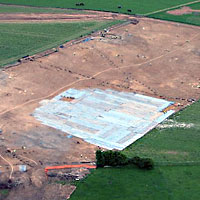
Lismullin's Temple
Experts had warned for years that the M3 should never have been routed through the Gabhra (Tara-Skreen) Valley. Related Links: Tara Watch submits DVD on Tara to Government. | Roestown national monument at Tara removed | Press statement from Campaign to Save Tara | Tara; The Inconvenient Truth by Martin Hogan, NUI Senate Candidate | Tara; The Inconvenient Truth by Martin Hogan, NUI Senate Candidate | Corruption Watch at Tara - Lets do some digging of our own
We told you so!  by TaraWatch by TaraWatch Wed May 16, 2007 03:28 Wed May 16, 2007 03:28   See article and link at (Other media) http://www.indymedia.ie/article/82583 or go directly to:  by Debbie Reilly & Donagh Maguire - Tara Solidarity Vigil by Debbie Reilly & Donagh Maguire - Tara Solidarity Vigil Wed May 16, 2007 12:16 Wed May 16, 2007 12:16   The Monkey Has Spoken  by W. Finnerty. by W. Finnerty. Wed May 16, 2007 14:08 Wed May 16, 2007 14:08   I believe I must be just one of MANY who feel extremely grateful for the fact that there are people in the immediate area of the Hill of Tara to keep a sharp eye on developments, and report events in the way you are doing to the millions who (like myself) cannot be there.  by Muireann Ni Bhrolchain by Muireann Ni Bhrolchain Thu May 17, 2007 18:38 Thu May 17, 2007 18:38   Friends of Tara,  by Muireann Ni Bhrolchain - Campaign to Save Tara by Muireann Ni Bhrolchain - Campaign to Save Tara  Thu May 17, 2007 21:59 Thu May 17, 2007 21:59 muireann at savetara dot com muireann at savetara dot com   Here is a press release from the Campaign. I'm including the remainder of the aerial photographs taken by Paula Geraghty on 24th April. There are also two aerial shots taken of a new site near Collierstown - these were taken by the Sunday World and have been given free of charge to the Campaign to use. If using Paula's photographs please credit her.
 by Muireann Ni Bhrolchain by Muireann Ni Bhrolchain Thu May 17, 2007 22:14 Thu May 17, 2007 22:14   Photograph of Collierstown from the sky - obviously this should also have been declared as a National Monument as well as Baronstown. The extent can really only be appreciated from this angle.
 by Muireann Ni Bhrolchain by Muireann Ni Bhrolchain Thu May 17, 2007 22:23 Thu May 17, 2007 22:23   These photographs show the area of Lismullin from various angles. This is linking up with the next series of sites at Skryne.
 by Muireann Ni Bhrolchain by Muireann Ni Bhrolchain Thu May 17, 2007 22:30 Thu May 17, 2007 22:30   The photograph of the hill itself shows the archaeological sites in the background, this is the site of the planned interchange - that is how close they are.
 by Muireann Ni Bhrolchain by Muireann Ni Bhrolchain Thu May 17, 2007 22:45 Thu May 17, 2007 22:45   And let us finish with the photographs that were taken at the beginning showing the impact of the road - and how can the road be moved around the henge with the Lismullin area with the other surrounding monuments?  by Muireann Ni Bhrolchain by Muireann Ni Bhrolchain Thu May 17, 2007 22:50 Thu May 17, 2007 22:50   This is the NRA's official aerial shot of Lismullin.  by Campaigner for Tara by Campaigner for Tara Fri May 18, 2007 09:46 Fri May 18, 2007 09:46   There are protesters at Roestown facing the construction workers. Huge machinery in the Valley.  by W. Finnerty. by W. Finnerty. Fri May 18, 2007 23:32 Fri May 18, 2007 23:32   I'm delighted to learn of newly formed "Heritage Protection Alliance of Ireland".  by Allyates by Allyates Sun May 20, 2007 20:47 Sun May 20, 2007 20:47   The party of Dev, the most 'Irish' of parties. Ha.  by W. Finnerty. by W. Finnerty. Mon May 21, 2007 20:37 Mon May 21, 2007 20:37   The information regarding the new roads scheduled to go through the hugely important heritage complexes in the Turoe area of County Galway, and the Hill of Tara area of County Meath, has been sent to Irish businessman and barrister Peter Sutherland, who, among several other things, is Chairman of Goldman Sachs International Bank at the present time. The full text of the e-mail sent earlier today, which was copied to several other people, can be viewed at: http://www.europeancourtofhumanrightswilliamfinnerty.co...l.htm .  by Dave Hall - Independent by Dave Hall - Independent Tue May 22, 2007 13:12 Tue May 22, 2007 13:12   A few teeth, a pin, a few bits of 'pottery', a dogs bones, and the ironic mobile phone in the massive ruts of plant machinery. Comparisons with stonehenge. The most important photograph is that of the four reporters and 3 (yes three) campaigners. I tihnk this says it all. lets get the election over with, the government back in and get our roads finished. lets not be held to ransom over a few pieces of so called pottery and a flint.  by M3 for M3eath by M3 for M3eath Tue May 22, 2007 14:22 Tue May 22, 2007 14:22   Let's recall that the henge was not copied in stone but must have served its purpose and was then allowed to fall down by our ancestors.  by Tommy Godfrey by Tommy Godfrey Wed May 23, 2007 14:46 Wed May 23, 2007 14:46   If I discount the archeological importance of the Tara site and take just a practical view, then I must consider geologic impact of a roadway through that area, not on a short but a long term basis. Although on this site are some contour mappings showing approximate levels they are not explicit enough to bring into view for a detailed examination to examine long term impact.  by Allyates by Allyates Mon May 28, 2007 15:25 Mon May 28, 2007 15:25   Of course, Tara declined, Dublin replaced it. Cant you guys see its important to establish it in terms of a continuity of our political and cultural history?  by JCaeiroAntunes by JCaeiroAntunes Tue Jun 12, 2007 02:26 Tue Jun 12, 2007 02:26   Stonehenge as well as other henges are cranes to move and transport heavy loads.  by ashamed once again to be irish - eire 32 by ashamed once again to be irish - eire 32 Fri Jun 15, 2007 21:59 Fri Jun 15, 2007 21:59   what political party if elected do you think would have stopped this "highway to the rat race"?  by ashamed once again to be irish by ashamed once again to be irish Fri Jun 15, 2007 22:18 Fri Jun 15, 2007 22:18   yet another sell out by the free state. when will it stop?they have nearly succeeded in doing britains dirty work by destroying our language,our history, our freedom and our minds.(think about it)  by Siobhan - TaraWatch by Siobhan - TaraWatch Fri Jun 15, 2007 23:40 Fri Jun 15, 2007 23:40   If Gormley does not prevent this cultural vandalism, He should resign as minister. |
























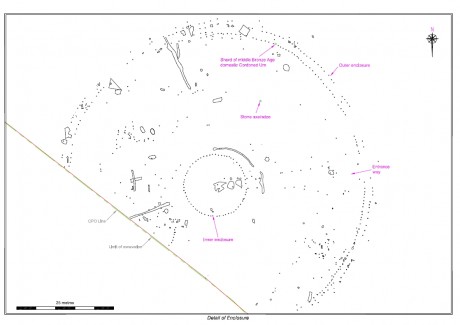
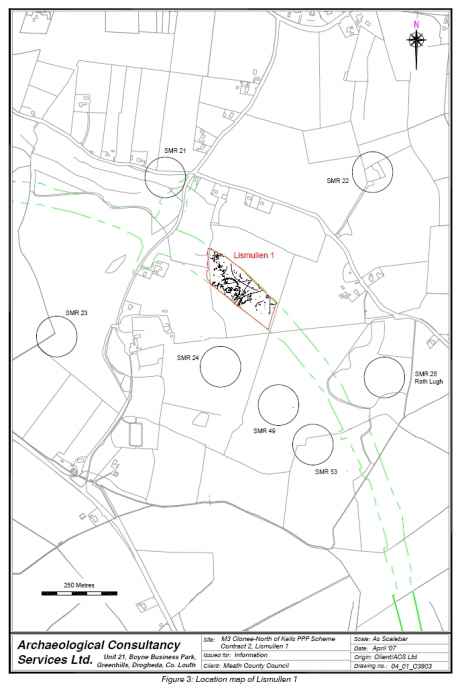
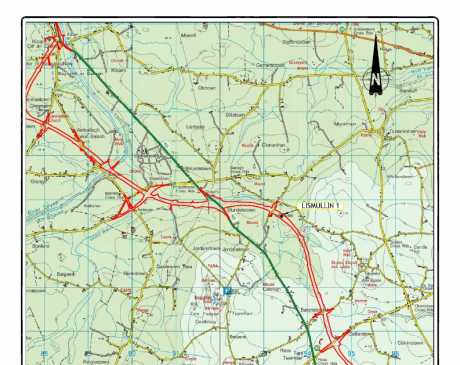
 printable version
printable version

 Digg this
Digg this del.icio.us
del.icio.us Furl
Furl Reddit
Reddit Technorati
Technorati Facebook
Facebook Gab
Gab Twitter
Twitter
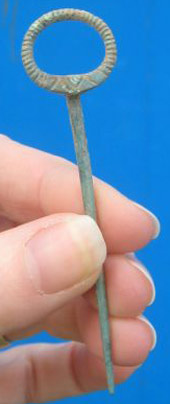






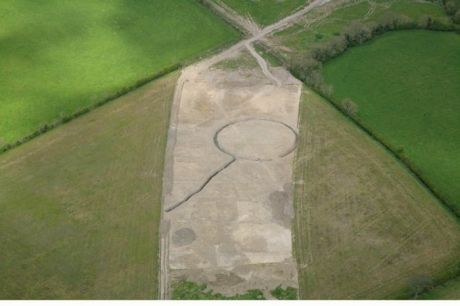
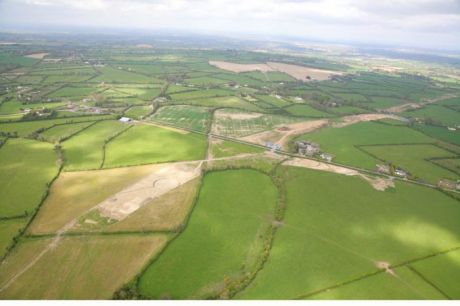













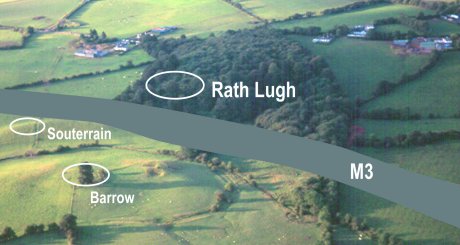



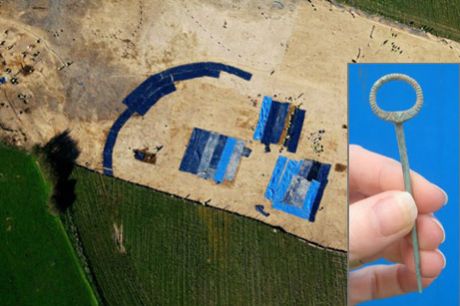
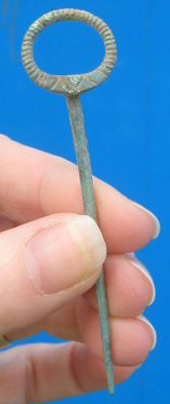

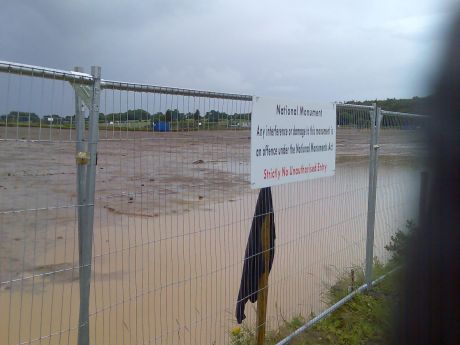

View Comments Titles Only
save preference
Comments (49 of 49)
Jump To Comment: 1 2 3 4 5 6 7 8 9 10 11 12 13 14 15 16 17 18 19 20 21 22 23 24 25 26 27 28 29 30 31 32 33 34 35 36 37 38 39 40 41 42 43 44 45 46 47 48 49Here is the story of the Battle of Gabhra - where the legendary Fianna are said to have been destroyed - in this very landscape
Could Rath Lugh be the putative burial mound of the Fianna.
The Battle of Gabhra
Patrick asks Oisín: “What sad mound is this the holds such a long grave? Whose grave is this that is greater than the rest? Who is buried here? Whose grave is this that has been heaped so high?”
“My heart is filled with sorrow for the number of the Fianna who fell here … I do not want to tell the tale,” said Oisín.
“Do not be afraid and tell us story of the death of the Fianna,” said Patrick.
“That is the grave of Oscar son of Garaidh and of the graves of the sons of Morna,” said Oisín.
“Why are they buried here?” said Patrick.
“I have a story of the king of Tara and the Fianna of Ireland,” said Oisín.
The Fianna were at Almhu feasting when messengers arrived from Cairbre Lifechair the king of Tara son of Cormac mac Airt.
“The king want a gift from you the Fianna,” said the messenger. “And if you do not give it – you will be treated as rebels. You must grant him the hunting of all Ireland.”
“We would never give that away!” said Oscar. “We will give great battle to the king!”
Cairbre gathered together the army at Tara. Ulster, Leinster and Connacht helped him. His friend Oscar son of Garaidh came from Scotland. When Oscar arrived at Tara he did not find the king there and he went to Gabhair.
“Welcome!” said Cairbre, “and you have arrived in time to join in the battle with the Fianna!”
Cairbre and his army saw the Fianna approaching. On the Plain of Gabhair the king set a fence of shields and javelins around Oisín and the Fianna. They cast spears and swords at one another and many shields were smashed. Cairbre the king threw the spear at Oscar so that it flew through his body. But Oscar replied by cutting of Cairbre’s head with one huge, mighty blow.
“We had an army of ten hundred and three battalions at Gabhair,” said Oisín. “When the battle was over we had twenty hundred warriors. I watch their graves on the plain of Gabhair.”
“Where are the Fianna buried?” asked Patrick.
“Under the stone erected by Caoilte at Gabhair lie Mac Lughach and Oscar. Under the stone on the south of the steep hill lie two kings. Under the stone at Gabhair lies Cairbre Lifechair.”
Impact at Rath Lugh
Huge area covered by plastic
The campaign to Save Tara took action for the media at Lismullin on May 3 2007. The event was captured by RTE News.
The campaign also sent out the following press release last week:
Arrogance and Ineptitude led to M3 Debacle
After the recent announcement of the discovery of a National Monument at
Lismullen, the Campaign to Save Tara is calling for any decision on the
future of the Henge to be postponed until the Election is over.
As far back as 2001 a Government funded research project reported that
the whole area around the Hill of Tara comprised a 'mosaic of monuments'
and should be considered as a whole and interconnected archaeological
landscape. During the preparation for the Environmental Impact
Statement, the NRA’s own archaeological advisors stated: ‘The monuments
around Tara cannot be viewed in isolation, or as individual sites, but
must be seen in the context of an intact archaeological landscape, which
should not under any circumstances be disturbed, in terms of visual or
direct impact on the monuments themselves.’ (Margaret Gowan and Co. Ltd,
Navan to Dunshaughlan Route Selection, August 2000, paragraph 7.3)
In his presentation to the An Bord Pleánala Oral Hearing (2002) Conor
Newman, ex-director of the Discovery Programme said: “… the valley
between Tara and Skryne is chock-a-block with archaeological monuments,
and interesting and complex ones at that: indeed it is a wonder that
with such results appearing at regular intervals along this route, why
was the whole route not surveyed.”
He said on the discovery of this present monument: “This is a monument
of major significance. It compares with Iron Age monuments found at the
related royal sites of Emain Macha and Dun Ailinne, and a discovery of
this magnitude in a landscape so heavily invested with ceremonial
monuments was predicted from the start. The view expressed on MCC's
website report that its position beneath the ceremonial complex on the
Hill of Tara suggests that it may have served 'smaller or lesser
political units' that might somehow have been skulking around the
fringes of Tara is frankly asinine.”
It is rather surprising that a site the size of Lismullen, where the
National Monument was uncovered, did not show up in the geophysical
survey but such examinations only reveal the tip of the iceberg as not
all archaeological features can be detected by geophysics. This advice
went unheeded by the NRA consultants at the beginning of this process.
Questions now arise as to the competence and rigour of the original
survey. For example, what other areas of the route through the Valley
have been inadequately surveyed or the survey results misinterpreted?
Michael Canney of the Campaign to Save Tara said: 'The Lismullen Henge
is undoubtedly a major find and its true significance lies in it
orientation and proximity to Rath Lugh and the Hill itself. There are
clear connections and all the evidence points to this being a major
monument located in a large and extensive 'Tara Complex', which extends
throughout the Valley.'
'The Government and the NRA rejected the Discovery Programme research
during the route selection process and now, three years and €40 million
in archaeological fees later, the motorists of Meath are faced with
further delays in delivering much needed infrastructure. If the
Government had read their own research, rather that favouring the
agendas of powerful local figures, the railway would be built and the
Tara Valley would have been given the recognition and protection it
deserves.'
In a related development Proinsias de Rossa MEP, will raise the matter
in the European Parliament on Wednesday next. The petitions committee of
the parliament has previously expressed concern about the proposed M3.
Mr. de Rossa is keen to ensure that all relevant EU legislation on
heritage is applied to the new National Monument. The Labour Party
Manifesto, published on Thursday last, explicitly sets out that it is
party policy to re-route the most controversial section of the route.
The Campaign to Save Tara is running an election campaign about the
Tara/M3 issue. They are seeking written assurances from all parties and
local candidates that they will re-route the road should they form part
of the next government. The campaign is urging its supporters to 'Vote
for Tara' on the basis of these written commitments.
Action for press and TV at Lismullin May 3 2007
The extent of the site
Apologies for putting up the wrong photograph earlier.
Impact at Rath Lugh
Press briefing and protest tomorrow. Everybody welcome. For further details click on
http://groups.yahoo.com/group/hilloftara/message/2904
Isn't it very shocking all the same that our cuddly Celtic ancestors took down and abandoned this site. Or destroyed / burnt it? What does that tell you about its importance to them? It seems they are more important then us, their descendants.
Nearly as shocking as the 30m of our money spent on looking for this sort of (large) monument, which missed it? No apologies from the experts, then.
Can we have our road on stilts? Or re-routed through where? Using which 500 archaeologists this time?
Can someone remind us how many national monuments are listed? Over 100,000 at the last count.
"Isn't it very shocking all the same that our cuddly Celtic ancestors took down and abandoned this site. Or destroyed / burnt it? What does that tell you about its importance to them? It seems they are more important then us, their descendants."
Yes, the colliseum, pyramids of egypt, parthenon and ancient babylon were also abandoned by their inhabitants and left to fall into ruin. We should tarmac over them and turn them into car parks, shopping centres and roads - it's obvious that they are of no importance and only anti-progress knockers could ever support the retention of such poor quality abandoned monuments.
On a more serious note, anybody who hasn't yet realised that the government are 100% responsible for the catastrophic lack of transport capacity on the N3 route really is wasting their brain. The campaigners predicted again and again that the chosen route was likely to encounter such historical sites. The government went with it due to their desire to please the landowners who got a fair few quid from CPOs. The rail service to Navan could have been completed years ago if they actually cared at all about the people of the N3 route - instead they just concerned themselves with jostling to get their noses in the trough and screw the people. "sure they're so thick they'll blame the hippies!" - and some of them are.
Keep up the good work. Tara must be saved.
Our children will never forgive us if it is lost.
FF/PD know the price of everthing (twice what everyone else pays for it)
and the value of nothing.
Build the road over the henge using 500 archaeologists to hold it up
How many archaeologists does it take to change a light bulb on the m3?
501 - 1 to change the light bulb and 500 to hold up the road.....
According to local sources, the discovery was probably intended to be hidden. The site was damaged by the huge earthmoving equipment according to the same sources.
Blame the Government for this fiasco and then blame the NRA - who do not want hugely significant sites to come to light. They are an unelected quango - answerable to no one at all.
There is a lot more going on here than meets the eye.
The Viking town at Woodstown was hidden as well and its significance was downplayed.
This hengiform monument type is ONLY associated with ROYAL SITES.
This is no ordinary find - its extraordinary and goes to show that geophysical surveys cannot do the job that proper archaeology does - when sites are dug by hand as they should.
Massive earthmoving equipment has no business in an area like this and there were 5 of them at one point. Photos will follow.
The NRA are using the worst practice in this the most important area in our landscape instead of best practice.
Its an absolute disgrace.
What role does DOELG have in this? their archaeologists are supposed to approve licence to excavate. has this been done?
The independent organisation on Irish heritage Duchas was dismantled by this administration.
The archaeologists were moved around and silenced to a great extent.
Then Minister Cullen changed the National Monuments act.
Yes, the licences were granted but this is the same company that hid Woodstown.
This administration has bullied everyone into silence, even the Archaeology Dept in UCD is funded by the NRA.
What this amounts is dictatorship with a complete erosion of democracy.
Tara is so important and they know this.
If this can happen at Tara - nowhere is safe.
Remember the adage "they came for the Jews and I did not speak up, they came for the communists" etc.
Then they came for me and there was no one left to speak for me.
If Tara is destroyed there will be nothing left to speak and everyone will have been silenced.
PRESS RELEASE – Campaign to Save Tara
Campaign calls for full excavation of Lismullin/Rath Lugh area
Following the discovery of an unknown and unflagged National Monument on
the route of the M3 the Campaign to Save Tara is now calling on the NRA
and the Minister for the Environment to fully excavate the area between
Lismullin and Rath Lugh. The fact that the huge henge of Lismullin
remained undiscovered and unidentified by geophysical surveys and
test-trenching means that the NRA's archaeological surveys and
test-trenching results are highly suspect.
When test-trenching was carried out in 2004 the whole corridor was not
examined. The trenches were cut at regular intervals along the route but
the intervening areas remain untouched. Given that a completely new site
has been uncovered in the Colliertown area (as revealed by the Sunday
World, 6 May 2007 with aerial photograph) there are probably other sites that remain to be
discovered.
The Campaign is also asking that the whole motorway corridor now be
examined in advance of the beginning of construction and also that the top soil
taken from the existing sites, now lying in huge spoil heaps also be
examined by hand as demanded by best archaeological practice. The
Campaign to Save Tara is also seeking independent advice as to whether
the National monument found at Lismullen has been damaged by the use of
heavy earth moving equipment in contravention of best archaeological
practice.
For verification contact Muireann Ní Bhrolcháin 087-9249510
To return to original thread here -
The work at Lismullin and Rath Lugh began in early January 2007 and the campaign and others drew attention to the fact that the area beside Rath Lugh was damaged and that the track of the motorway appeared to be very close to the Rath. Lismullin wood was savagely hacked down with indecent haste, so much so that a worker was injured by a falling tree. Work was carried out in dreadful weather conditions and under cover of darkness. This is accompanied by a series of photographs that were taken by various members of the campaign over a period of four months.
The earliest photograph shows that there was an awareness at a very early stage of an important site – bronze age pottery and flint in a find bag. This was however left out to the elements as the photo shows.
Indication of a bronze age site February 2007
such things called catilist by ancient sparta----works like the oraoaclas---take into account population under influcence of war------regions there in-------------druid acctivetee---mans realshoinship with animals-----intellgence gatering of the nature of the lords stuff other lands --how to shift the tide not become the hen
These are four photographs of the wooded area at Lismullin, very close to the henge. Huge diggers were used as can be seen. The massive depth was cut and trees felled without archaeological supervision until the Campaign drew this to the attention of the media and the Museum.
Here is a report from the Irish Times at the time, note what the NRA archaeologist Mary Deevy says:
Dr. Ní Bhrolcháin said standards of best archaeological practice were not being observed and that the directions issued by Mr. Roche in May 2005 regarding the treatment of archaeological sites "are being openly flouted".
But Mary Deevy, project archaeologist with the NRA, insisted that a site in a Save Tara photograph was part of an esker ridge - "two fields away from Rath Lugh" - which was used for private small-scale gravel quarrying.
She had walked from Lismullin to Rath Lugh earlier this month with Heather King, a senior archaeologist from the department, "who confirmed that no damage had been done to archaeological sites" in the area.
Asked if the Minister's directions were being flouted, Ms. Deevy said: "Absolutely not". She added that the contractors involved in the work were fully informed on archaeological sites "and know very well what sites to avoid".
Mr. Roche had specified that the removal of forestry and topsoil at Lismullin and Ardsallagh was to be "carried out under archaeological supervision" and all construction topsoil stripping was to be archaeologically monitored.
"There is no archaeological supervision of forestry clearance at Lismullin", Dr. Ní Bhrolcháin said. "Neither is there any archaeological monitoring of large-scale earthmoving from the base of the Rath Lugh escarpment".
"Such actions completely undermine Rath Lugh and the assurances given by the Minister in relation to this, one of our nation's most sensitive archaeological and historical landscapes", her statement said.
She explained that Rath Lugh "stands as a sentry over the Gabhra Valley guarding the northern and north-western approaches to the Hill [of Tara] and overlooks other nearby recorded archaeological monuments".
Dr. Ní Bhrolcháin said stratified archaeological sediments were visible in photographs of damage done to what she claimed was Rath Lugh. "If there were archaeological supervision such works would have been brought to a halt".
She also queried why such work had started under cover of darkness when an archaeologist would be unlikely to see freshly disturbed archaeological strata.
Although the Minister had said that his directions were "both comprehensive and onerous" and would "protect heritage" sites along the M3, Dr. Ní Bhrolcháin said that his expressed wishes "are being 'comprehensively' ignored".
© The Irish Times, 16th. January 2007.
So - they knew what sites to avoid. What about the henge? Did they know about that? Apparently not - not until late March-early April according to themselves.
Lismullin Wood February 2007
What hope for archaeology here?
Lismullin wood February 2007
Destroyi8ng Lismullin Wood
A spoil heap is the name used for the soil that is scraped away and left to one side. This is not examined by companies working on roads projects.
Many archaeological finds are found in this depth of soil. Not content with leaving the spoil heaps unexamined - they add insult to injury by driving the heavy machinery over the heap.
Spoil heap at Lismullin March 2007
Another view of spoil heap 30 March 2007
Lismullin site 30 March 2007
Digger marks at Lismullin 30 March 2007
Depth of initial cut Lismullin 30 March 2007
This piece of pottery was lying in the spoil heap in full view from the neighbouring field. Need I say more?
Some archaeology this. Hardly what they call best practice.
Bucket marks Lismullin 30 March 2007
Caterpillar marks Lismullin 30 March 2007
Spoil heap Lismullin 31 March 2007
Pottery found in spoil heap Lismullin 31 March 07
Same pottery again
Here is the heavy machinery used at Lismullin. No wonder the NRA describe the area as "truncated" by ploughing as they were ploughing through the site.
This is March 31st - by April 4 they were reporting a National Monument to the department. I wonder why all of a sudden.
A find at Lismullin 31 March 2007
Huge machine at Lismullin 31 March 2007
Huge bucket used at Lismullin 31 March 2007
Heavy machinery Lismullin 31 March 2007
Photos taken on Sunday 1st April - the day that the Sunday World April Fool piece was published.
Little did Paddy Murray realise that it was about to come true!
Teeth at Lismullin 1 April 2007
Burial of what at Lismullin 1 April 2007
Depth of the cut Lismullin 1 April 2007
Henge area 1 April 2007
Lismullin find 1 April 2007
Now they know they have something. All covered up under blue plastic with little round stones
Aerial shot 24 April
Closer view 24 April
Here are close up views of the site from the ground taken on 29th April and 3rd May 2007.
A dog was buried near the henge. His body was intact on 29th and he had been "bagged" as they call it by 3 May.
Dog burials are found at other ceremonial royal sites. Dog bones were found on Tara as well.
How long did he lie here undisturbed by ploughing to be ripped from the ground?
Dogs were considered sacred animals in early Ireland.
Henge site 29 April 2007
Canine burial 29 April 2007
Extent of henge site with cut wood in background 29 April 2007
Canine grave and henge May 3 2007
Respectful protest 3 May 2007
The campaign takes the opportunity to talk to the media who are really interested at last. Long may it last.
Thank you Tara for yielding up your most precious and sacred site just in time to make the world sit up and take note.
We were losing hope of you and you came to your own and to our aid with the perfect of timing .......
The campaigners
Great feature. Some decent, knowledge-based coverage badly needed. well done.
Well done on a very well put together piece, keep up the pressure.
Mark.
There are reports coming through tonight of heavy construction machinery being moved into the area around Colliestown in the Tara/Skryne Valley. The solidarity camp on the Hill are meeting tonight to discuss the significance of this and what action is to be taken.
Pictures and a statement from the camp will follow shortly.